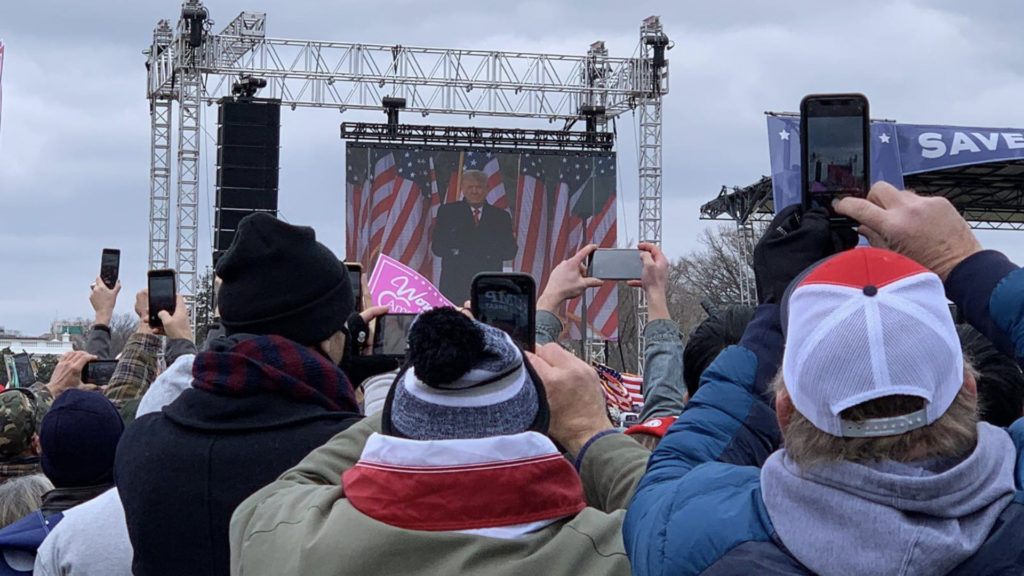
Trump, Insurgency, and Religious Grievance
Steven K. Green
Photo by Pierre Châtel-Innocenti on Unsplash.
This article is part of our “Chaos at the Capitol: Law and Religion Perspectives on Democracy’s Dark Day” series.
If you’d like to check out other articles in this series, click here.
Like many Americans, I watched the live images of the insurgent siege of the nation’s Capitol on January 6 with distress and horror. As the rioters were surging up the Capitol steps, I noticed among the numerous Trump flags a large banner with the word “Jesus.” (Apparently, other insurgents carried “Jesus Saves” and “Jesus 2020” banners while one insurgent who entered the Capitol carried the “Christian Flag.”)
My initial reaction was to ask the W.W.J.D. question: would Jesus have approved of the insurgents’ violent undermining of American democracy? I considered next the irony of the rioter’s Jesus banner. Here, a supporter of the most nonobservant president since Richard Nixon was seeking to deny a devout believer in the redemptive message of Jesus Christ the lawful ascension to the presidency. Something was amiss.
On first blush, the attempted insurrection of January 6 had nothing to do with religion but instead an allegedly stolen election. But then again, it did have a religious connection. As commentators have noted for years, President Trump has long promoted the “politics of grievance”—a contention that he, and many rank-and-file Americans, have been aggrieved by the elites, the media, and the powers at be, such that the lifestyle and values of the average American are under siege. Anyone who has seen even excerpts of a Trump political rally has heard this narrative: “They” are attempting to deprive you of your freedoms and your rightful heritage, so you have a right to feel aggrieved.
Trump’s election victory in 2016 was due in no small part to his success in playing this message to conservative Christians (Trump received over 80% of conservative Christian votes). Once in office, Trump continued with the same narrative—that religious conservatives, and their values, were under siege. In 2017, Trump posed for a photo op with the Little Sisters of the Poor, who had been pursued by the Obama Administration for not providing contraceptive insurance coverage for their employees. Coinciding with that event, Trump signed an Executive Order (13798) to prevent the federal government from “bullying and even punishing Americans for following their religious beliefs.” Afterwards, his Justice Department released a directive to address discrimination that people of faith had allegedly experienced through federal regulations, with the document declaring that the administration “will not allow people of faith to be targeted, bullied or silenced anymore.” As Trump told a cheering audience at the 2017 Values Voter Summit, “We are stopping cold the attacks of Judeo-Christian values,” adding that only he would “defend our faith and protect our traditions.” Over and over, the Trump administration promoted this narrative of religious grievance throughout its time in office.

Donald Trump Speaking to Supporters at the “Save America” Rally by Voice of America. (PD-US).
Unsurprisingly, this message resonated with a large number of Christian conservatives. According to a public opinion poll released by the Public Religion Research Institute (PRRI) shortly after the 2020 election, 73% of “Fox News Republicans”—those people who regularly watch conservative media1According to PRRI, in addition to being more politically and socially conservative, Fox News Republicans are more likely than non-–Fox News Republicans to identify as white evangelical Protestants (36% vs. 26%) and to attend religious services at least once a week (46% vs. 35%).—said that Christians face “a lot of discrimination” in today’s society, whereas much smaller numbers believed that non-Christians and non-whites face discrimination.
One controversy that has contributed to this narrative of religious grievance has involved the enforcement of nondiscrimination laws against small business owners who refuse to serve members of the LGBTQ+ community on religious grounds. Many specific controversies have ended up in court. The Trump Administration and its Justice Department sided with Christian business owners, citing religious discrimination in the enforcement of such laws. After the Supreme Court’s holding in Masterpiece Cakeshop, the White House announced that “we were pleased with the Supreme Court’s decision. The First Amendment prohibits government discriminating on the basis of religious beliefs, and the Supreme Court rightly concluded that the Colorado Civil Rights Commission failed to show tolerance and respect for his religious beliefs.”2According to a Human Rights Campaign report, the Trump-Pence administration was “the most virulently anti-LGBTQ administration in decades.” https://www.hrc.org/news/the-list-of-trumps-unprecedented-steps-for-the-lgbtq-community. Few issues have done more to reinforce the idea of religious grievance for many conservative Christians.
More recently, the narrative of religious grievances has culminated with numerous incidents involving the enforcement of social gathering restrictions on houses of worship due to the COVID pandemic. Some religious leaders have seen the uneven enforcement of the rules and the seemingly arbitrary designation of “essential” services as evidence of religious discrimination.. To be sure, some early orders that restricted the size of religious gatherings while exempting certain “essential” entities—such as casinos in Nevada—made little sense. See Calvary Chapel v. Sisolak, 140 S.Ct. 2603 (2020). But such nonsensical distinctions had more to do with insensitivity rather than hostility toward religious communities. However, this was not how such examples were portrayed by conservative religious advocacy groups who have argued that various officials have “imposed unjust burdens on religion not felt by secular entities,” and that churches are “are still receiving unequal treatment compared to many secular businesses, such as restaurants, professional offices, manufacturing facilities, and even cannabis retailers.” Again, there may be merit to some claims of misapplication of regulations due to the efforts of officials to deal with the pandemic. But regardless of whether these claims hold merit, the controversy has fed the existing narrative of religious grievance.
President Trump has long promoted the “politics of grievance”—a contention that he, and many rank-and-file Americans, have been aggrieved by the elites, the media, and the powers at be, such that the lifestyle and values of the average American are under siege.
And then there was the 2020 presidential election where the favorite of many religious conservatives did not win. Like other Trump supporters, some conservative religious groups promoted the unproven narrative of voter fraud and a stolen election. In late December, the blog of the American Family Association screamed “Voting Fraud: Staggering evidence of illegal and fraudulent voting in the 2020 presidential election.” Taking a more subtle approach, Alliance Defending Freedom suggested that “many [people] want to wait for all the votes to be counted and any potential legal proceedings to be completed. At Alliance Defending Freedom, we join with our fellow Christians in simply praying for God’s will to be done.” The day before the January 6 rally and riot, Liberty Counsel alleged that 432,000 votes had suspiciously been “removed” from President Trump’s tally in Pennsylvania while repeating a rumor that over 12,000 Georgia votes “were illegally switched from Trump to Biden.” The narrative of religious grievance now included the loss of Christian votes.
Given this background, no one should have been surprised to see Jesus banners and Christian flags alongside QAnon and Dixie battle flags in the storming of the Capitol.3Ironically, although the modern Christian Flag originated in 1897, its roots trace to the Crusade “flag of conquest” (“By this sign Conquer”) which was used in sieges of Muslim citadels. See https://rationalwiki.org/wiki/Christian_flag. What religious flags had to do with the events of January 6 is abundantly clear. As said, Trump promoted this narrative of grievance to his supporters throughout his presidency. The precipitating threat leading up to and following the election was that the Democrats and the media were seeking to steal the election and to deprive people of their right to vote. But that was only one part of the larger narrative of grievance, of which religious grievance constitutes a significant aspect.
Possibly, those people holding the banner and flags were Christian nationalists—a loose band of adherents of Christian Identify and other ultra-conservative Christian movements. But to categorize these insurgents as simply being Christian nationalists allows us to pass them off as extremists and minimizes the broader impact of the grievance narrative on religious conservatives. I am not suggesting that the violent rioters were representative of Christian conservatives generally any more than one should associate all Black Lives Matter protesters with a handful of anarchists. Fortunately, many evangelical leaders condemned the siege in no uncertain terms—although disappointingly, the statements of a few conservative religious leaders were more equivocal.
All in all, Trump tapped into a perspective that many religious conservatives have held for a while. This time, there were tragic consequences. With the ascension of a Democratic administration promoting more liberal policies, the narrative of religious grievance is unlikely to go away on its own. Joe Biden faces significant challenges in his administration ahead. Let’s hope that as a person of faith, he will be able to ameliorate this sense of religious grievance, rather than inflame it. ♦

Steven K. Green is the Fred H. Paulus Professor of Law and Affiliated Professor of History and Religious Studies at Willamette University in Salem, Oregon. He is the author of six books and over forty scholarly articles and chapters on church-state matters, and he regularly collaborates on amicus curiae briefs at the US Supreme Court.
Recommended Citation
Green, Steven K. “Trump, Insurgency, and Religious Grievance.” Canopy Forum, January 12, 2021. https://canopyforum.org/2021/01/12/trump-insurgency-and-religious-grievance/

